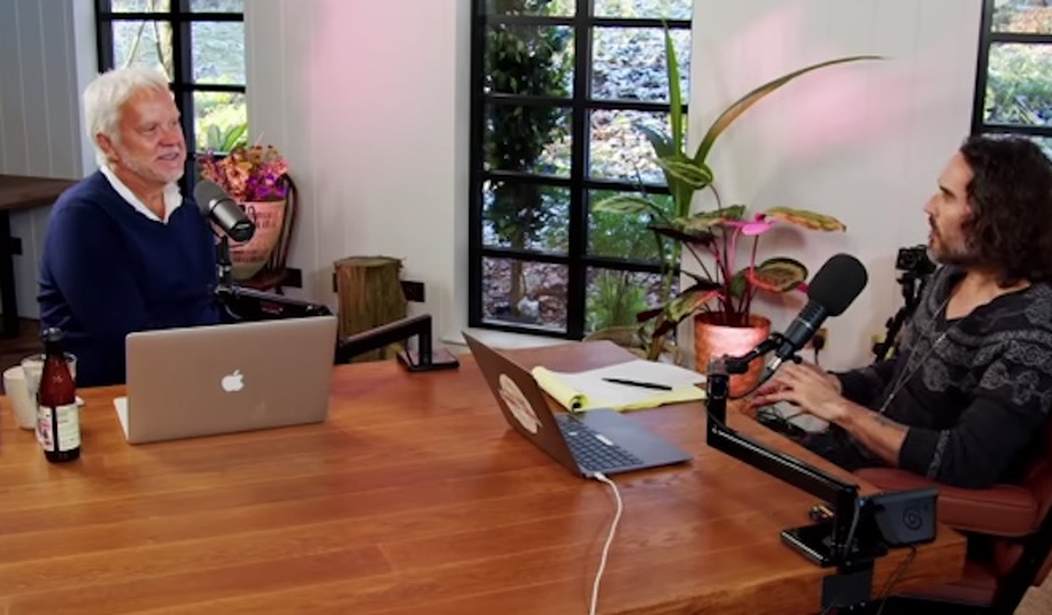Has secularism evolved into a “new religion,” and has the state become its god? This conversation between actors Tim Robbins and Russell Brand first got published a couple of days ago, but it’s well worth watching now. In this clip from a longer episode published on Rumble, the two discuss a disturbing new trend — the devolution of science and materialism into a pernicious new religion, one without any possibility of redemption, let alone humanity.
Rather than provide people with a shared set of values, Brand notes, it imposes a strict agenda and even stricter enforcement against any heresy or “apostasy.” That became most evident in the COVID pandemic, Brand suggests, but goes well beyond it.
“We’ve given too much authority to people” on the basis of rationality, Brand argues, and “they’re not even playing by the rules of science that they laid out for us.” Robbins agrees that this has become “a new religion,” and that he’s awakened to its dangers (via Zero Hedge):
Brand asked Robbins about the rise of censorship in response to the pandemic, measures which saw the “granting of paternal authority to a state that always offers us safety, to a corporate sector that always offers us convenience, all the while banalizing the human experience, turning us into data.”
“This is a new religion,” responded the Shawshank Redemption star.
“It’s exactly like a religion, it’s dogmatic, it’s absolute – if you do not believe in it you are condemned to hell, maybe this is a new religion,” he added.
Brand agreed that pandemic narratives were being “posed as politics, but it’s behaving like a religion.”
“Seems like it, seems like it has some of those aspects at least,” said Robbins.
First off, I’d recommend watching this extended clip in its entirety. Robbins goes on to discuss his work in the prison system, clearly inspired by his starring role in The Shawshank Redemption, in helping to engage with those behind bars. I’m one of the people to whom he refers that think this one of the best films ever, mainly for its specific focus on redemption and its possibilities. (I’m a sucker for redemption stories.) That work in itself is notable and interesting, and I may look for the longer conversation to hear more about it.
The possibility for redemption and recognition of human frailty is essential, and that is precisely what statism and authoritarianism reject in a key way. Robbins and Brand make this case as well — that the authoritarian nature of our present culture and the no-questions-no-dissent policies within it replace God with a very faulty and incompetent State. Our founders recognized this in rejecting the monarchy and its claims of divine appointment to power, and in putting in place checks on authority as well as liberty to question and dissent. The British system evolved in that direction as well, but as Brand points out, it is now bending back to a more authoritarian nature based on an implicit claim on infallibility — a claim that keeps getting exposed as false on both sides of the pond.
That fallibility is why authoritarianism must get structured as a religion at some point. Questioning the power would expose the failures. It’s a corollary of sorts to F.A. Hayek’s argument about the nature of socialism and power in The Road to Serfdom. Systems based on centralized control and planning are based on a presumption of omniscience, and when that fails, the system will defend itself not by surrendering power but by increasing it and punishing those who oppose it.
That is precisely what Robbins and Brand describe here — a religion, or better put, a cult. This refreshing exchange is both necessary and delightful.
Addendum: Adam Baldwin and I had a similar discussion of this in the same context of the pandemic in our Amiable Skeptics episode on December 19, and a little bit in today’s as well. Shutting down questions is the tactic of cults, not science nor democracy.








Join the conversation as a VIP Member